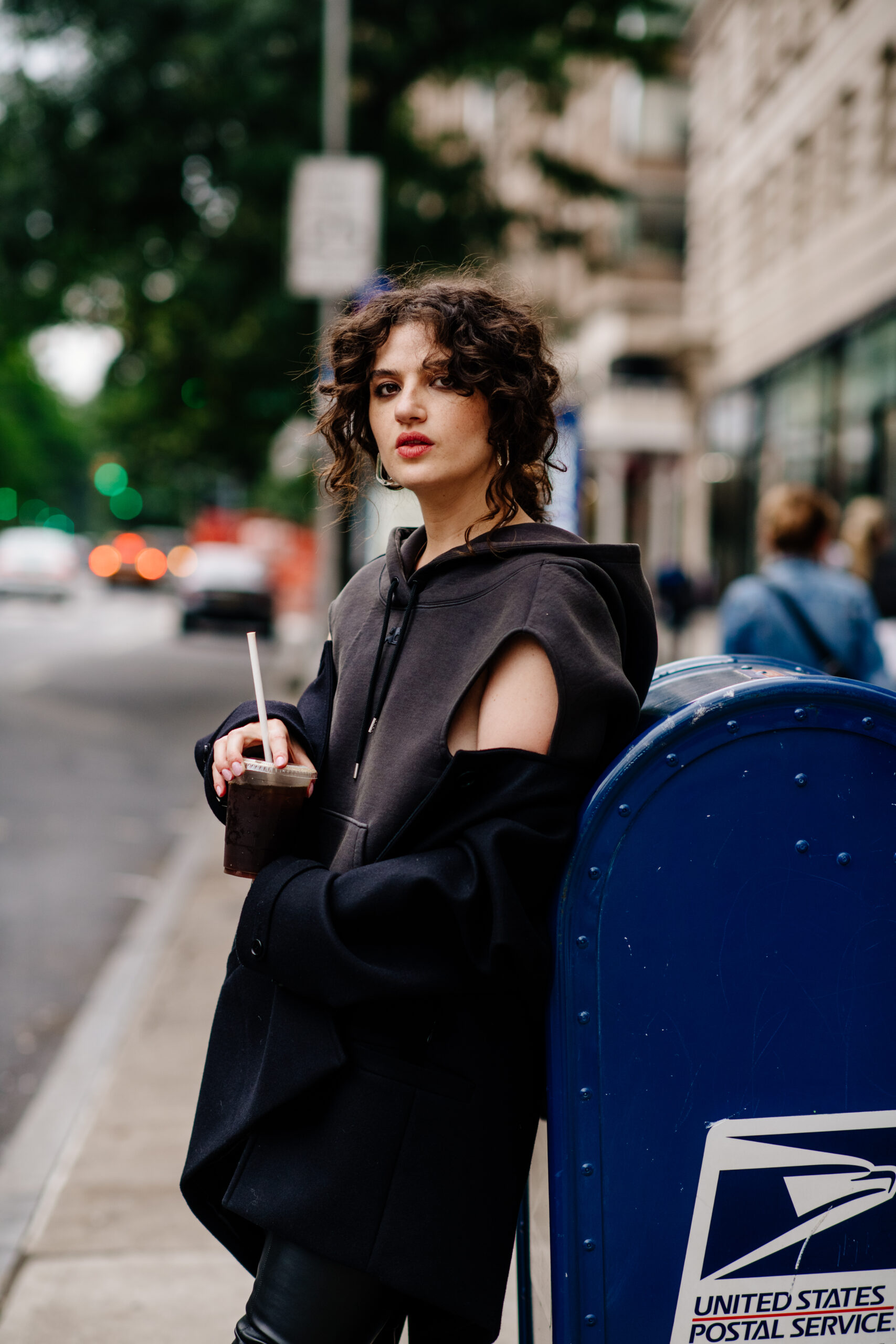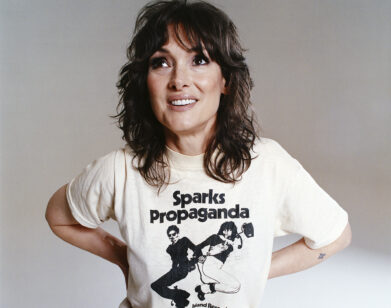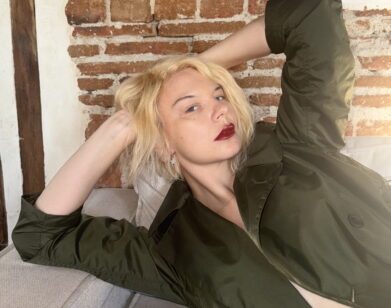DIRECTOR
Emma Seligman and King Princess on Horny Teens and High School Trauma

With Shiva Baby, Emma Seligman made the type of debut movie that demands attention. A twitchy, tense comedy that also introduced the world to Seligman’s friend and collaborator Rachel Sennott, the movie was a pandemic success story that announced the arrival of a distinct new voice. Shiva Baby‘s success meant that the NYU film school grad was going to get another shot at directing, next time with bigger budgets, more extras, and greater responsibility. That moment has arrived with the release of this week’s release of Bottoms, a movie that has been described a million times as a “lesbian Fight Club,” but is actually an anarchic and horny take on the high school comedies Seligman grew up watching. Starring Sennott, who also co-wrote the film with Seligman, and Ayo Edebiri as two queer students who, yes, start a sort of fight club in the hopes of losing their virginity to cheerleaders, Bottoms marks the moment where Seligman transitions from hungry artist with a dream to studio-backed filmmaker with a vision, and the money to make it happen. With that comes pressures and expectations, which her friend, the musician King Princess, recently helped her unpack.
———
EMMA SELIGMAN: How are you?
KING PRINCESS: I was so sick yesterday. I took a night-night pill, went to sleep for like 12 hours, then I woke up and played The Sims for another 12 hours, and then took some antibiotics, and now I’m healed.
SELIGMAN: That’s great to hear. Is this your hangover cure?
KING PRINCESS: No, I still don’t have that down. But I watched the movie last night.
SELIGMAN: Oh yeah? What’d you think?
KING PRINCESS: First thoughts: Marshawn Lynch is major.
SELIGMAN: He’s pretty incredible.
KING PRINCESS: Do you know about his football career at all?
SELIGMAN: I didn’t before we casted him, but now I do. Did you?
KING PRINCESS: Yes, I’m a huge Marshawn Lynch fan, for a couple reasons. First of all, I love Beast Mode, which is his athletics brand. Second of all, he dedicated a lot of his career to teaching young players how to handle their finances. Because when you’re a kid and given a large sum of money, it’s easy to blow it. And he really steps up to the plate and teaches people how to manage their finances and do taxes and invest. That’s really special and wonderful.
SELIGMAN: Yeah, I remember him talking to Rachel [Sennott] and I about that. He underplays everything, so he talked about that being important to him, but the fact that you know about that means that he’s obviously doing it on a massive level, which is really cool.
KING PRINCESS: The fact that me as a non-binary gaylord knows that, is massive.
SELIGMAN: [Laughs] No, that’s not what I’m trying to say, but when someone tells you something personally, you’re not sure how much the rest of the world knows. But he cares very deeply about different causes, and that tracks for him.
KING PRINCESS: And he’s funny as fuck. So obviously I’ve seen Shiva Baby and you and Rachel are a duo in a lot of ways, and I love that. It’s beautiful to have a collaborator like that, especially cross medium, because you’re a director, and she’s an actor and writer. You are not in front of the camera, but you’re facilitating one of your best friends being in front of the camera. How did that process change from Shiva to this?
SELIGMAN: I keep using this word and not knowing if it’s the right word, but it feels amorphous, or like Rachel and I are one being, and the creativity and output and tag-teaming will just manifest the way it needs to for each project. It got stronger in terms of understanding that shared language and knowing what the other needs. But when you talk to someone everyday for years and you’re working on the same thing, it’s hard to distinguish how your relationship has changed, or how it’s improved work-wise. I feel like it’s gotten stronger, our instincts have gotten sharper. We’re able to support each other, but call each other out on our own shit quicker.
KING PRINCESS: It’s beautiful working with people that you love, but it’s hard to differentiate yourself from another person. At a certain point you kind of mesh into one. I work with my girlfriend [Quinn Wilson] on a lot of stuff, and we’re always fighting off set, but then on set, we’re this perfect machine and it works really well. Ayo’s ability to make comedic beats happen in this movie is awesome. Meeting and hanging out with her was awesome, too. Was this your first time working with Ayo?
SELIGMAN: Yeah, it was really impressive. Her ability to understand slapstick humor is incredible. I don’t see that anymore, that Jim Carrey-style physical humor. Every time I rewatch the movie, I find something new that she’s doing with her body. Often when you’re on set and you have actors that get the movie, especially when they’re the leads, you’re not focusing as much on them, because you’re like, “You’re good. Cool.” It’s everything else that you’re freaking out about. It’s later when you’re in the edit that you’re like, “Oh my god, they’re killing every single take.” Watching Ayo was like that, and it was really validating because we’d written that role for her years ago.
KING PRINCESS: It’s a really fun group of people. It just looked like you guys had fun making it.
SELIGMAN: The first couple days on set were so fun. I’m remembering how much you, Rachel, and Ayo were joking around in our chairs as I was freaking out, trying to figure this whole movie out.
PRINCESS: It was definitely a very safe, beautiful first experience for me to be on a set, with people my own age. That’s really important. I think people wait for an opportunity that is bestowed to them by somebody who is extremely proven in an industry, whereas I see you guys, friends in the same age group, making stuff together. It reminds me of this Netflix show, The Movies That Made Us, which I fall asleep to. It’s a really heartwarming docu-series about how movies were made. They did one on Ghostbusters, and they talk about Dan Akroyd and his buds literally going to the woods and smoking weed and writing Ghostbusters. It’s literally friends geeking out, hanging out, coming together. Another one is the making of Wet Hot American Summer, which is one of my favorite movies of all time. Again, buddies from the comedy circuit just decide they’re going to make this movie. So yeah, I’m very envious, but also extremely happy for you that you get to make movies with people your own age instead of dealing with the process of being chaperoned into the industry. You’re not an AD on blah blah’s set. You are doing the thing, which is dope.
SELIGMAN: It’s dope, but there’s pros and cons, because you really are just thrown into the deep end, and there’s no way to learn other than by just doing it. I also think it’s a reflection of young people hiring other young people. The head of our studio, Alana Mayo, isn’t exactly our age, but she’s young for her position. I feel like it takes other risk takers and other young people who are in positions of power to hire more of their people. But you don’t feel proven. You’re like, “I don’t know anything.”
KING PRINCESS: I feel the same way about making a record. I’ve only made two, and every time, they’re like, “Are you making a record?” I’m like, “I don’t know.” There’s no school for making a record. It’s confusing. But I want to pivot to horny gay teens, because we don’t talk about them enough.
SELIGMAN: We don’t.
KING PRINCESS: No, we talk about teens with unrequited love that are crying and journaling, but we’re not talking about girls who want to get finger-blasted. How did that come into your life?
SELIGMAN: I feel like teenagers, at least from what I witnessed in high school, are the horniest creatures of all time. I was tired of seeing queer teens be so innocent on screen and just want to give someone a tiny little kiss and hold their hand. That’s sweet, and I do think young love is romantic and cute, and it’s nice to see that portrayed in queer stories when we haven’t had that for forever, but I just couldn’t relate. I wasn’t out in high school, but if I had seen more horny queer teens the way that I’d seen horny straight teens on screen, I might’ve felt more accepted and seen.
KING PRINCESS: You should have come to my school because I would’ve given you a lot of inspiration.
SELIGMAN: I’m sure you would have. I actually feel like you wouldn’t have talked to me or something. I would’ve been such a loser.
KING PRINCESS: I wasn’t popular. I was so traumatized from my childhood of being so gay and so bullied throughout elementary school that I got to high school, and I was just mean. I was like, “Ain’t nobody fucking with me now.” But I was a softie, very gay and sad, but also very horny. I liked intelligent people, so we would’ve been friends, but you would’ve thought I was crazy. My friend group were the mean, smart people.
SELIGMAN: I see.
KING PRINCESS: They were the rude girls who weren’t popular.
SELIGMAN: Interesting.
KING PRINCESS: I’m still friends with those girls and they’re still like that.
SELIGMAN: Are they the ones that I met that night?
KING PRINCESS: Yes, there’s a ginger and brunette.
SELIGMAN: Yes, I remember.
KING PRINCESS: My angels. Okay, back to the movie. So you’ve given birth for a second time. You’re in the hospital, full episiotomy. You did it, no epidural. How does it feel?
SELIGMAN: I’m a week away from birth.
KING PRINCESS: Because it’s not in theaters yet?
SELIGMAN: Yeah. But I feel like it’s going to be good.
KING PRINCESS: The reviews are really good.
SELIGMAN: The early reviews of the baby being born are really, really sound positive.
KING PRINCESS: Everything looks good.
SELIGMAN: It does feel like that, from what the doctors are telling me. It’s such a roller coaster, though. I’m sure you feel this way when you’re putting out a record, but you put so much freaking hard work and energy, and it becomes more important than anything else. And then you get to slowly have that tension released, and it feels really nice and rewarding. When we were at South By, it was like defibrillators on me and it was amazing. There were all these queer UT [University of Texas] kids there, and I was like, “I think it was worth it.”
KING PRINCESS: There’s two different releases. There’s one to the people who need it, who you made it for. You don’t get praise or negativity from those people, you just know that it found the right place in space and time for somebody. That’s how I feel about certain releases, where I’m like, “I know this has entered into a sphere that is beyond me, and somebody will cherish it.” But then there’s the thing that we all crave and need, even though it’s fucked up, which is the reviews and box office. So for me, there’s always two different releases, and I have to really focus my energy on the one that matters more.
SELIGMAN: That’s such a good point. I felt that release at South By. I was like, “We did it. Some queer kid out here likes it, and if it’s just them, then that’s fine with me.” But then there’s the other one that you try to manage your expectations of. I felt this way with Shiva, where if I sit still for too long, I feel this avalanche in my body of feeling the tingling of all the people, but particularly people it’s for, that are starting to rise up who are about to support the movie. I remember the night before Shiva came out, we had done the virtual festival circuit for so long and were collecting audiences for so long, that I felt this spiritual emotional feeling of all these young women who are going to help launch this movie into the sphere where other people can watch it, too. I know you deal with adrenaline every night you perform, but when you feel so dead making something, it feels so overwhelming. It feels so tingly.
KING PRINCESS: Totally, yes. Do you feel that way on set? Because I know for me, the prepping process is hell because, making music is the best part until you’re sitting with the music, and then you’re like, “I am sitting on this music and I hate myself.” Do you get off on being on set?
SELIGMAN: Prep is the worst for me as well. I think it is for everyone, but it’s also the most important and that’s why it feels so stressful. You’re counting down the hours and you haven’t locked the location and you want a shot list but you can’t because you don’t know the dimensions of the place, and the colors of the furniture that’s going to affect the rest of the image. I think it takes a second to get into the groove, and I feel like on Shiva, I felt it every day. I was like, “Yeah, I’m a director.” You get into an adrenaline rhythm. On Bottoms, it took me a minute to feel that way, because it takes so long to set up each shot. I’m very grateful that we had full equipment and big shots of all these extras, but you’re like, “Yeah, that felt great,” and then you wait, I don’t know, 25 minutes for all the extras to be placed, and you’re just taking deep breaths. So it sometimes can, not kill the adrenaline, but it forces you to try to direct. It’s just your job.
KING PRINCESS: I love the way you talk about it, because I do feel like there’s a lot of posturing in leadership roles, where you’re like, “This experience is beautiful. Every shot was perfect, it was totally under control.” It’s really nice to hear the honest emotions of making anything, which is that it’s scary, it’s frightening, it’s exhilarating, it’s emotional. These are all super real feelings that people should know exist. It’s not just rainbows and it’s not just despair, it’s everything. It’s like, “I birthed this project out of my womb. It was so hard for me.” Or you get, “It was a breeze. ” You never get the in-between, which is the real shit.
SELIGMAN: When I made my first movie, I didn’t understand what I was feeling. I was like, “Am I just super sensitive or something?” And the more I talked to other directors, they were like, “This is normal.” But I never heard directors talking about that. I don’t know why. I don’t know if it’s bad to talk about your emotions.
KING PRINCESS: Yes! People think it’s bad to talk about their emotions unless they’re perfectly curated. Historically, it’s a sign of weakness to talk about your feelings, but it’s important because there’s kids out there, there’s queer people, who are going to watch this movie and go, “I could be a director.” Because anytime you’re a young person, especially a queer person who puts out something, it definitely is inspiring to people who just don’t think that they’ll be able to do such a thing. But then with that also comes the responsibility of actually talking about how hard it is, because not everybody who has the inclination towards a medium is going to be successful, but to be an honest artist who expresses how difficult and challenging, but rewarding something is, teaches us work ethic.
SELIGMAN: Yeah, and usually if it’s a breeze, unfortunately it’s not a great sign. But at the same time, I don’t like to promote the idea that art is suffering. It just can be challenging.
KING PRINCESS: It is challenging. It’s not suffering, for sure. At the end of the day, you and I are both in professions that are basically getting paid to do what we love.
SELIGMAN: Yeah, and how cool is that?






